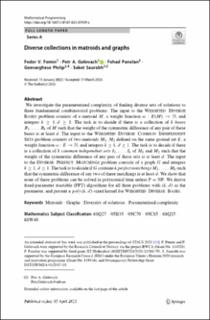Diverse collections in matroids and graphs
Journal article, Peer reviewed
Published version

Åpne
Permanent lenke
https://hdl.handle.net/11250/3127015Utgivelsesdato
2023Metadata
Vis full innførselSamlinger
- Department of Informatics [917]
- Registrations from Cristin [9489]
Sammendrag
We investigate the parameterized complexity of finding diverse sets of solutions to three fundamental combinatorial problems. The input to the Weighted Diverse Bases problem consists of a matroid M, a weight function ω : E(M) → N, and integers k ≥ 1, d ≥ 1. The task is to decide if there is a collection of k bases B1, . . . , Bk of M such that the weight of the symmetric difference of any pair of these bases is at least d. The input to the Weighted Diverse Common Independent Sets problem consists of two matroids M1, M2 defined on the same ground set E, a weight function ω : E → N, and integers k ≥ 1, d ≥ 1. The task is to decide if there is a collection of k common independent sets I1, . . . , I k of M1 and M2 such that the weight of the symmetric difference of any pair of these sets is at least d. The input to the Diverse Perfect Matchings problem consists of a graph G and integers k ≥ 1, d ≥ 1. The task is to decide if G contains k perfect matchings M1, . . . , M k such that the symmetric difference of any two of these matchings is at least d. We show that none of these problems can be solved in polynomial time unless P = NP. We derive fixed-parameter tractable (FPT) algorithms for all three problems with (k, d) as the parameter, and present a poly(k, d)-sized kernel for Weighted Diverse Bases.
